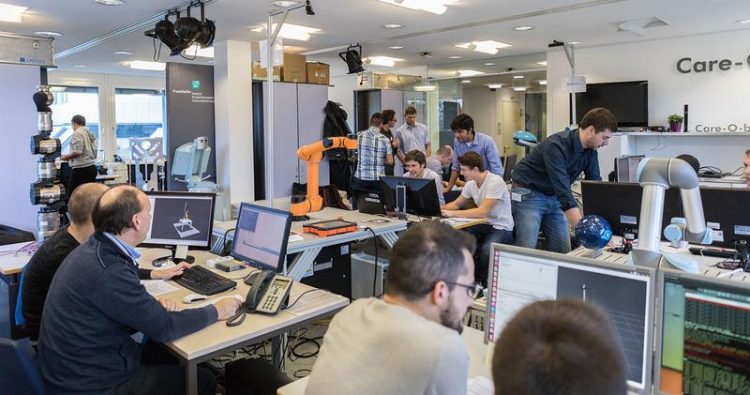ROSIN project: towards an EU Digital Industrial Platform for Robotics through Open-Source Software

Several training sessions within Europe will be held to make ROS-Industrial more accessible and well-known. Fraunhofer IPA
ROSIN will create a step change in the availability of high-quality intelligent robot software components for the European industry. It will achieve such objective by building on the existing open-source Robot Operating System (ROS) framework and leveraging its worldwide community.
ROS-Industrial already focuses on extending the applicability of ROS to factory automation. Fraunhofer IPA and the TU Delft University of Technology (TU Delft) respectively manage and provide scientific advisory to the European branch of the ROS-Industrial initiative. Both organizations are part of the ROSIN project consortium, which can thus benefit from the existing ROS-I network and collaboration activities with industrial partners.
Bringing ROS to the factory floor by improving software quality
To achieve the project’s aims, the partners – besides Fraunhofer IPA it is TU Delft as coordinator, the IT University of Copenhagen, the FH Aachen University of Applied Sciences, Fundacion Tecnalia Research & Innovation and ABB AB – need to answer two questions on the suitability of open-source software (OSS) for manufacturing.
The first one is about software quality, which has to conform to industrial requirements. To ensure this, ROSIN introduces a breakthrough innovation in automated code quality testing in an effort led by the IT University of Copenhagen. This is complemented with a full palette of quality assurance measures including novel model-in-the-loop continuous integration testing with ABB robots.
The second question focuses on the level of industrial interest in Europe towards OSS and the opportunity to further invest in it. On the one hand, there are already examples of operating installations running on ROS. On the other, this question is closely related to code quality, with the two factors holding each other in deadlock: further quality improvement requires industrial investment, and vice versa. ROSIN will resolve this deadlock.
Targeted investments for interested entities
In parallel to the developments bringing quality improvements, more ROS-Industrial tools and components will be created and existing ones will be improved. This will be performed by making 50% of the ROSIN budget available to collaborating European users and developers for so-called Focused Technical Projects (FTPs). ROSIN maximizes budget efficacy by alleviating yet another deadlock: experience shows that industry will fund ROS-Industrial developments, but only after successful delivery. ROSIN provides pre-financing for FTP developers to reach the first milestone (up to 30% of the total costs), when such developers commit to subsequently fund the remaining expenses. Entities (with a legal seat in the EU and collaborating countries) interested in this financially supported collaboration are welcome to apply via www.rosin-project.eu.
Support for educational activities and commercial exploitation
Broad EU-wide educational activities, led by FH Aachen, and community-building activities, led by Fraunhofer IPA, will make ROS-Industrial a well-known, accessible tool for factory automation. To ease commercial exploitation of ROS-Industrial applications, Tecnalia will coordinate the creation of a commercial release template with guidelines addressing technical and non-technical (e.g., licensing) matters. The critical mass of trained students and professionals, together with a clear path to commercial exploitation, will result in a widely adopted, high quality, open-source industrial platform.
Compact information
Full project title: ROSIN – ROS-Industrial quality-assured robot software components
Duration: January 1st 2017 to December 31st 2020
Website: www.rosin-project.eu
Funding: This project is funded by the European Union’s Horizon 2020 research and innovation programme under grant agreement No 732287. Total EU contribution: 7.504.236 EUR.
Project partners: Delft University of Technology (The Netherlands, coordinator), Fraunhofer Institute for Manufacturing Engineering and Automation IPA (Germany), IT University of Copenhagen (Denmark), Fachhochschule Aachen University of Applied Sciences (Germany), Fundacion Tecnalia Research and Innovation (Spain), ABB AB (Sweden).
Upcoming events:
March 22nd to March 24th 2017: Project partners will be available at the European Robotics Forum (ERF) in Edinburgh.
April 19th to April 21st 2017: Project partners will be available at Robobusiness Europe, hosted by RoboValley in The Hague and Delft.
Press communication
Dr. Karin Röhricht | Phone +49 711 970-3874 | karin.roehricht@ipa.fraunhofer.de
Expert contact partner
Dr. Mirko Bordignon | Phone +49 711 970-1629 | mirko.bordignon@ipa.fraunhofer.de
http://www.rosin-project.eu
http://www.ipa.fraunhofer.de/en/project_rosin.html
Media Contact
All latest news from the category: Information Technology
Here you can find a summary of innovations in the fields of information and data processing and up-to-date developments on IT equipment and hardware.
This area covers topics such as IT services, IT architectures, IT management and telecommunications.
Newest articles

First-of-its-kind study uses remote sensing to monitor plastic debris in rivers and lakes
Remote sensing creates a cost-effective solution to monitoring plastic pollution. A first-of-its-kind study from researchers at the University of Minnesota Twin Cities shows how remote sensing can help monitor and…

Laser-based artificial neuron mimics nerve cell functions at lightning speed
With a processing speed a billion times faster than nature, chip-based laser neuron could help advance AI tasks such as pattern recognition and sequence prediction. Researchers have developed a laser-based…

Optimising the processing of plastic waste
Just one look in the yellow bin reveals a colourful jumble of different types of plastic. However, the purer and more uniform plastic waste is, the easier it is to…



